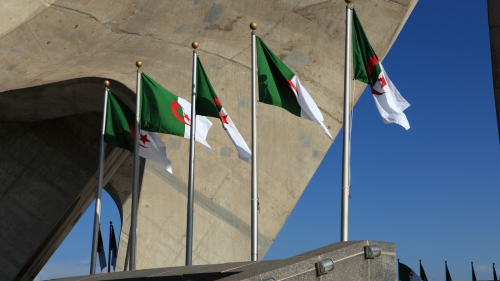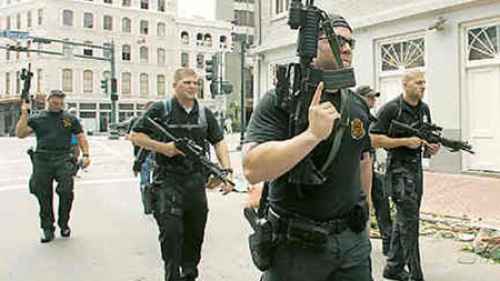AIS and the new threat of violence in Algeria
Algeria's Islamic Salvation Army (AIS) has reportedly threatened to take up arms again, two years after declaring a unilateral cease-fire. The threat, made by AIS chief Madani Mezrag and reported in Algeria's El Watan on October 19, poses a significant challenge to the policies of newly elected President Abdel Aziz Bouteflika. But the manner in which Mezrag's call for the resumption of the jihad to establish an Islamic state in Algeria was made mostly reflects badly on the AIS itself.
The AIS is the armed branch of the Islamic Salvation Front (FIS), the party which was denied an impending 1992 election victory when the Algerian military moved in and took over the government in an apparent attempt to prevent the Islamists from taking power. Since the FIS took up arms, some 100,000 Algerians are said to have been killed. Most of those killed were innocent villagers supposedly massacred by the rebels but with possible complicity from the Algerian military, according to a variety of analysts. Since the 1997 cease-fire, the FIS has pursued largely amicable relations with the Algerian government and this summer reached a preliminary reconciliation whereby former rebels who had not committed murder or rape could lay down their weapons and be reintegrated into society. Some rebels rejected the cease-fire and broke away from the FIS to form their own factions, as was the case for the Armed Islamic Group (GIA) that continues fight to this day. But the FIS reconciliation had been well received by the Algerian people.
But now the AIS has laid down new demands in order to meet the Bouteflika-set January 13 deadline for the disarmament of all rebel forces. Mezrag has reportedly said the AIS will take up arms again unless the government carries out the following conditions: releasing from jail of two prominent FIS leaders, lifting the ban on the FIS and allowing its rehabilitation, disarming civilian militias and granting full amnesty, together with economic integration, of all rebel fighters who laid down their arms.
The threat of more bloodshed if the cease-fire with the FIS should indeed fall through certainly presents a difficult situation for Bouteflika. Bouteflika's previous success in achieving some sort of reconciliation with the FIS was an important factor in an apparent recent increase in the President's popularity. Bouteflika's election earlier this year was widely seen as flawed when all other candidates withdrew from the race on allegations of vote rigging. But a September 16 popular referendum on Bouteflika's policies in terms of reconciliation and social problems won a large approval rating for the President's contested tenure.
Should Algeria suffer another upsurge in violence, it could be seen as a sign that Bouteflika is not doing his job effectively. For his own sake let alone that of his people, the President cannot risk a renewed conflict with the FIS. The latest attack that left six Algerian shepherds with their throats slashed, reportedly carried out by the GIA, illustrates the dire consequences of the government's inability to deal with armed rebel groups. And while Bouteflika has been praised for his performance so far, a few influential Algerians have recently leveled some piercing criticism.
In a letter written to Bouteflika and published on the web-site of the Algerian Press Service on October 19, Abdelkader Hadjar, president of the Committee on Foreign Relations of the Popular National Assembly (APN), criticized the President for not using Arabic when addressing the nation and thereby selling out to the francophone "foreign secular minority." In other criticism, Hadjar also accused Bouteflika of ignoring the "word of God" in his rule of the country.
As popular as he may be at the moment, Bouteflika cannot afford to ignore the sentiments of Algeria's Muslim population. The popularity of the FIS may have waned since 1992, but should the FIS again take up arms, many could fault the government in resonance with the opinion of FIS leader Abdelkader Hachani who says Bouteflika's reconciliation gestures so far are not what they seem. Hachani said in a recent interview with the Swiss daily Le Temps that the proposed reconciliation was "a fragmented, if not police-like, measure that sanctions a security approach to resolve an eminent political crisis."
But whereas the new AIS demands do not seem overly ambitious for lasting reconciliation, Bouteflika perhaps also cannot be seen as being overly compromising with the banned Islamist movement. If the editorial tone of such influential Algerian dailies as El Watan can be taken as any indication of popular sentiment, the AIS threat has caused a considerable backlash against whatever popularity the FIS held when reconciliation was earlier agreed upon. An editorial in the October 19 edition of El Watan calls the FIS a "criminal organization," whose rescinding of the earlier settlement reveals that their previous overtures were a "ruse." The article charges that the previous reconciliation was "nothing but a swindle by the Islamists in order to gain more time and find new forces."
Bouteflika has yet to decide how to handle the AIS threats. The AIS threat to continue the war against the government traps the President between the need to deal fairly with the rebels and the exigency to not appear soft on the Islamists, who are perhaps seen as unpredictable terrorists. But even if the FIS has legitimate concerns over the present reconciliation agreement, the wording of Mezrag's threat can only serve to delegitimize those concerns. In a country that has lost some 100,000 people, many of them in gruesome civilian massacres, a group cannot play with such words as "massacre" and "destruction" and expect to receive any popular support for its demands. Far from achieving greater respect for Islamist demands, legitimate or not, Mezrag's threats to resume the killing can only push the FIS further away from reintegration into Algerian society.
Zakariya Wright is a staff writer at iviews.com















